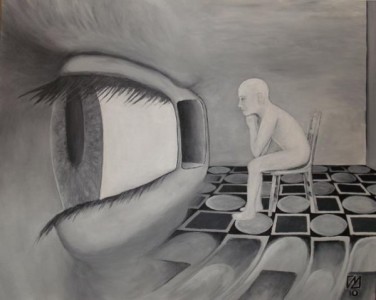Reality shock
 When I was eleven, I had what I later decided to call a “reality shock.” The world suddenly seemed unreal, as if I were having a dream. I remember going up the street to the home of a friend and standing with her in the backyard by the swing set. I kept asking her: Is this a dream?
When I was eleven, I had what I later decided to call a “reality shock.” The world suddenly seemed unreal, as if I were having a dream. I remember going up the street to the home of a friend and standing with her in the backyard by the swing set. I kept asking her: Is this a dream?
Today psychiatrists call this derealization. Evidently it’s frequently accompanied by depersonalization, a sense of detachment from the self. But I wasn’t dissociating. I still knew who I was. I just couldn’t understand how the world could all of sudden become unreal. It was particularly difficult for me, I suspect, because none of the adults in my environment recognized or acknowledged I was experiencing something gone terribly wrong.
This altered state of mind, triggered by a profoundly disturbing event, lasted from early-afternoon until I fell asleep that night. I have no recollection of the next day. In retrospect, I thought of this experience as waking up from the daily dream of childhood into the reality of adult life. While the world resumed its quality of being real, there’s a sense in which my life was never the same.
A silver lining?
Although the experience was extremely stressful, there was something about it that I eventually came to appreciate. I couldn’t have formulated it this way at the time, but I now knew — from direct experience — that reality was precarious, fragile, and somewhat arbitrary. This wasn’t something that worried me or that I dwelled on. It was more like a secret — a valuable suspicion — in the back of my mind.
In high school I came across something that struck me as an additional clue. It involved an abstract mathematical structure (Hilbert space) and its relation to quantum physics. I didn’t understand the details at the time, but one thing was very clear. The mathematics of Hilbert space was developed in the late 19th century and the first decade of the 20th century. Hilbert space was a concept in pure mathematics (like number theory), i.e., the concepts were totally abstract, with no correspondence to anything in the physical world. But lo and behold, in the late 1920s/early 1930s, physicists working out the new science of quantum mechanics “discovered” that Hilbert space was exactly what they needed to explain what was happening at the level of the quantum.
A mathematical concept that was purely an invention of the human mind turned out to correspond exactly to the so-called “real” world. This seemed significant to me – further evidence that if reality was not entirely arbitrary, it was at least constructed by the human mind.
The gap between self and world
Who knows why some things are so personally meaningful that they shape the rest of our lives. My sense is that this childhood experience was a very formative one for me. If it had happened to me as an adult, I would have been given a psychiatric – or more likely these days, a neurobiological — explanation. As a child, left to myself, I had only my imagination.
Now, as an adult, I find I am interested in reality, consciousness, the self, time, and death — death because it means the loss of reality, consciousness, self, and time. They are all of a piece. And so I am starting this blog on the self and all that that concept conjures up for me.
Related posts:
Anxiety, mysticism, and reality
Image source: Smashing Lists

Sorry, comments are closed for this post.